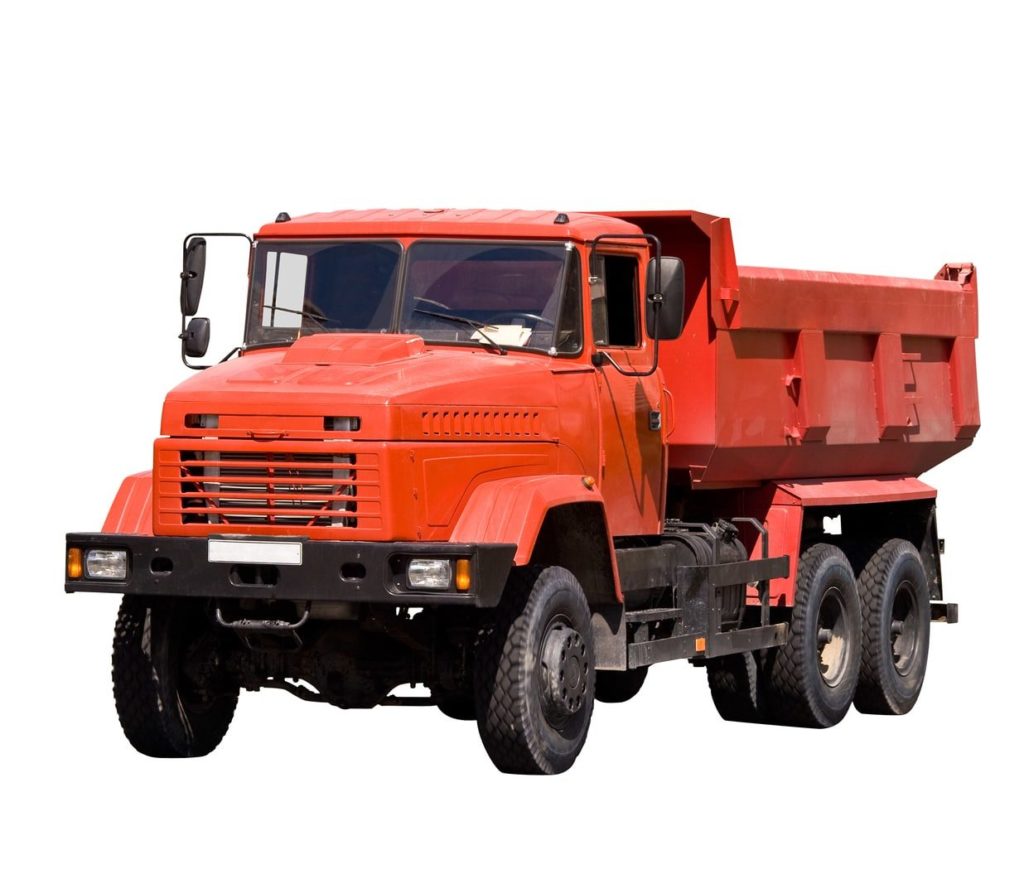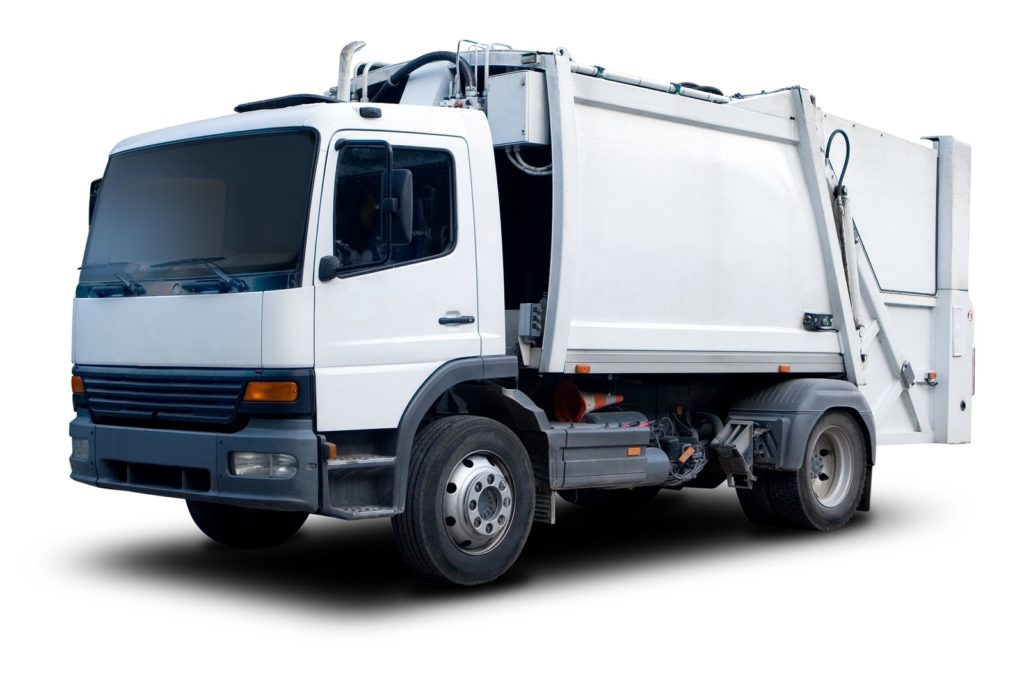Dump Truck & Garbage Truck Accidents
Few people associate dump trucks and garbage trucks with serious traffic accidents. Most newsworthy heavy truck accidents involve tractor-trailers jackknifing, rolling over, or causing highway pileups. However, dump trucks and garbage trucks also contribute to a fair share of damage on Washington State roadways. Below, we’ll discuss the characteristics and dangers of dump and garbage trucks, how to avoid an accident, and what to do if the worst happens.
If an accident involving a dump or garbage truck has injured you or a loved one, contact an experienced truck accident injury attorney today to answer any questions you may have.
Characteristics of Dump Trucks and Garbage Trucks
Dump trucks and garbage trucks come in a variety of sizes and configurations. Depending on the intended everyday use of the vehicle, dump trucks and garbage trucks may vary by design.
Dump Trucks

Dump trucks typically carry raw materials, e.g., sand, gravel, or dirt, in an open-top, enclosed bed. The bed of the truck is likely mounted on a hydraulic lift. When activated, the lift system elevates one side of the bed such that the materials may be emptied from the bed. Most dump truck lift systems tip the bed to enable cargo to spill at the rear of the truck. However, others are configured to dump material to one side or from the bottom of the cargo bed.
Most dump trucks on the road are designed with the truck cab and cargo bed mounted on a single chassis. Other configurations include trucks equipped with removable cargo beds and cargo beds mounted on semi-trailers. The mounted cargo bed is then connected to the truck’s cab, just as the configuration of a typical tractor-trailer.
Garbage Trucks

Unsurprisingly, a garbage truck’s primary purpose is to haul waste materials. Most garbage trucks are equipped with a powerful hydraulic system to compact waste in the cargo container. The container that holds the waste is typically enclosed. Garbage trucks are also equipped with a variety of mechanical lift systems. The lifts enable operators to grasp and raise street-side garbage containers and then dump their contents into the bed. A recycling truck may employ a similar design with the function of moving recyclable materials to designated facilities.
Like dump trucks, the vast majority of garbage trucks are single-chassis vehicles. Other configurations include dump trucks with “roll off” (or removable) waste containers, which are frequently used on construction sites.
Where You Are Likely to Encounter Dump Trucks and Garbage Trucks
Dump trucks and garbage trucks are pervasive on U.S. roadways. Drivers are likely to encounter these trucks anywhere people live, work, dig, or build, which is to say, everywhere.
Dump trucks travel along Washington’s highways and back roads with equal regularity. They idle in traffic at city intersections and rumble over dirt roads at construction sites. Of the common trucks on the road, garbage trucks tend to blend into the background. Because drivers are desensitized to the prevalence of waste collection trucks, sharing the roadways with them can be particularly dangerous.
Garbage truck routes are slightly more limited in range, but they are just as prevalent as dump trucks on the roadways. Garbage trucks are essential to maintaining sanitary living conditions in our communities. They serve a vital role in fulfilling homes’ and businesses’ waste disposal needs. Garbage trucks utilize highways to travel to and from landfills. Similar to dump trucks, they blend in with other vehicles on the roadways.
What Makes Dump Trucks and Garbage Trucks Dangerous
There are several reasons why waste collection truck crashes are particularly dangerous to motorists, cyclists, and pedestrians.
- Dump and garbage trucks are large, heavy vehicles that tend to travel around everywhere, and they possess features that can make them dangerous to others on the road. These vehicles have blind spots on all four sides and require more distance to come to a safe stop, making them hard to handle. Furthermore, they are commonly seen on narrow roads and tight spaces, increasing the chances of an accident.
- Drivers are often inexperienced. In the State of Washington, dump and garbage truck drivers are required to carry a Class B commercial driver’s license. Oftentimes, truck operators do not obtain the appropriate license, especially when dump trucks are driven in connection with construction and industrial activities. Unqualified drivers often operate Class B vehicles on construction sites when only a short trip is required. However, despite the distance traveled, inexperienced drivers have a greater risk of causing an accident.
- The cargo they haul is not “road-friendly.” Almost everyone has experienced the frustration of riding behind a dump truck that is actively spilling its load. Drivers may behave recklessly in an attempt to dodge gravel pebbles to avoid a cracked windshield or scratched exterior. Virtually any cargo carried by either a dump truck or a garbage truck can create a hazard to other road users. Cargo contents may make the road surface unsafe, create roadway hazards or obstacles, or become a dangerous projectile.
Of course, dump truck and garbage truck accidents may be caused for the same reasons as any other vehicle accident. Unlike passenger vehicle collisions, large, heavy trucks can cause catastrophic damage, especially when a passenger car is involved. In addition, as discussed, the spill of cargo onto the roadway can cause significant danger leading to further damage.
Common Dump Truck and Garbage Truck Accidents
What kind of accidents do dump trucks and garbage trucks get into on a regular basis? Here are some common scenarios leading to truck accidents.
- Blind spot accidents. Dump trucks, like other commercial vehicles, have deceptively large blind spots on all sides of the vehicle. When combined with the relative inexperience of many drivers and the narrow, winding roads they often travel, the likelihood of a blind spot accident increases. Motorists in passenger cars may not realize that they are invisible to drivers. Lack of visibility is hazardous for cars in lanes to the right of a dump truck. For example, a truck driver making a right turn may be unaware of any vehicle on the truck’s right side. There is also the danger of dump truck and garbage truck drivers failing to clear their blind spots before changing lanes. A serious accident will likely result when a truck cuts off another vehicle.
- Sideswipe accidents. As noted above, dump trucks and garbage trucks take up significant space on narrow streets. Sideswipe accidents occur when the side of the truck collides with other vehicles, either in motion or parked. Sideswipe accidents have a reputation for being “minor” accidents. However, when a dump truck or garbage truck is involved, they can often cause extensive damage. The height and weight of these trucks can destroy smaller vehicles. Severe damage to a smaller vehicle is the best-case scenario in sideswipe collisions. At worst, the truck sideswipes a car in motion, shattering its windows or crushing its roof, resulting in a catastrophic collision.
- Rollovers. Dump trucks, by their very function, carry unsecured loads. You cannot tie down or strap down a load of gravel or sand. Unsecured loads involve the inherent risk of creating a vehicle imbalance. An unbalanced load can cause a loss of control which, in turn, can lead to a truck tipping over. Rollovers frequently occur at intersections or roads with sharp curves when drivers misjudge the distance between objects. Garbage truck loads are not as inherently unstable as dump truck loads. However, garbage trucks have a relatively high center of gravity, making them susceptible to rolling over.
These types of accidents represent common scenarios for dump truck or garbage truck accidents. However, accidents involving commercial trucks can be caused by other factors. Despite the causes of dump or garbage truck accidents, they can cause serious injuries and fatalities.
Common Injuries After a Waste Management Truck Accident
Depending on the type of accident, the injuries sustained in a collision with a garbage truck or other waste disposal unit can be life-threatening or fatal. Common injuries seen after such accidents include:
- Traumatic brain injury
- Spinal cord Injury
- Broken bones and fractures
- Burns and lacerations
- Soft tissue damage
- Chest contusions
All of these injuries must be treated with care as soon as possible following a collision to ensure that they do not worsen. Filing a personal injury claim after a truck accident can ensure that you have the necessary resources to cover the costs related to your recovery.
After a Dump Truck or Garbage Truck Accident
Catastrophic accidents are traumatic for all involved. Victims of accidents involving a dump or garbage truck frequently find themselves overwhelmed and confused. Drivers and passengers of smaller vehicles, cyclists, and pedestrians often face life-altering injuries as a consequence of a truck collision. Like other commercial vehicle accidents, dump and garbage truck accidents can involve multiple parties.
Following an accident, victims will likely be bombarded by insurance company representatives encouraging them to settle their claims. Insurance representatives and employers are interested in attaining one goal: minimal financial liability. Other parties to the case will work hard in an attempt to avoid responsibility for the compensation the injured victim deserves. Here are some tips to help injured victims navigate the aftermath of a devastating accident.
Understand What’s Happening
A dump truck or garbage truck is virtually always a commercial vehicle. Typically, the trucks are owned by a trucking company or municipal body and driven by the business’s employees or contractors. Typically, that vehicle provides services to third parties. For example, trucks may be rented to haul raw materials or waste.
When an accident happens involving that truck, the driver, the driver’s employer, and the third party may all be responsible for compensating injured victims. Each of those parties may carry insurance, which means their respective insurance companies may also be liable for damages.
Avoid Insurance Adjusters
Soon after an accident involving a dump truck or a garbage truck, victims may hear from representatives of the insurance companies. Although insurance companies may admit they owe injured victims some compensation, they aim to minimize their financial exposure as much as possible. Representatives are aware of your circumstances and may try to take advantage of your need to pay mounting medical expenses. On the other hand, insurance companies may attempt to get victims to admit fault that may lessen or eliminate their responsibility.
Victims of accidents involving dump trucks or garbage trucks should avoid having any interactions with other parties’ insurance companies. Of course, victims may need to speak with their own auto- or health-insurance carriers. However, it is important to remember that other parties’ insurance companies do not operate in your best interests. They only look out for their own. Experienced lawyers will likely have the skills necessary to negotiate a fair settlement on their client’s behalf. Let a lawyer deal with relentless insurance representatives so that you may focus on your recovery.
Seek Medical Care
No matter what vehicles are involved, the cardinal rule of motor vehicle accidents is that injured victims should always seek immediate medical care. Even if you feel that your injuries are minor, it is important to be evaluated by a medical professional. Many severe, even life-threatening, injuries from motor vehicle accidents do not display symptoms immediately. Not only are symptoms delayed, but so injuries can only be detected with advanced diagnostic testing.
Accident victims should always see a doctor and be open and honest about any pain they are experiencing. A medical evaluation can ensure a full recovery. In addition, medical records may provide critical evidence for demonstrating that the accident caused the injuries.
Speak With an Experienced Truck Accident Lawyer

We can all hope dump and garbage truck drivers do everything possible to avoid causing an accident. However, when an accident occurs, the truck’s driver, owner, or customer in possession may be responsible for any accident-related damages. Under Washington State law, injured accident victims have the right to recover the compensation they are entitled.
Obtaining that compensation, however, typically involves a complex claims process. Victims should contact a skilled lawyer with years of experience representing victims of truck accidents. Experience allows attorneys to identify the parties who may be legally liable for an injured victim’s losses. The sooner the victim (or the victim’s family) contacts a lawyer after an accident, the sooner victims may secure the compensation they deserve.
Victims should not wait to speak with a lawyer. The businesses that operate dump trucks and garbage trucks function on tight margins within layered corporate structures. They will try to escape their responsibility for paying damages at all costs. If an accident involving a dump or garbage truck has injured you or a loved one, contact an experienced truck accident injury attorney today to answer any questions you may have.
Boohoff Law
2200 6th Avenue, Suite 768
Seattle, WA 98121
(877) 999-9999
Free Consultation
We Are Here For You 24/7
Reviews
– Elissa M.
“Really pleased with Boohoff Law! Received immediate responses when I had any questions. Treated amazingly by all staff … made this process a true breeze!”
– Caitlyn M.
– Brandy K.
Related Posts
Sidelined by a Sudden Door? Figuring Out Who Is Liable in a Dooring Bicycle Accident
After the Impact: Who Can Be Sued in a Commercial Truck Accident Case?
What if My Child Was Injured on a School Bus? How To Protect Their Rights and Future
Recovery is personal.
We’re here for you.
We’re close by. And if you can’t make it to us, we’ll meet you where you need us, at home or in the hospital.
You're better off with Boohoff.











The information on this website is for general information purposes only. Nothing on this site should be taken as legal advice for any individual case or situation. This information is not intended to create, and receipt or viewing does not constitute, an attorney-client relationship.
available 24/7
(877) 999-9999
